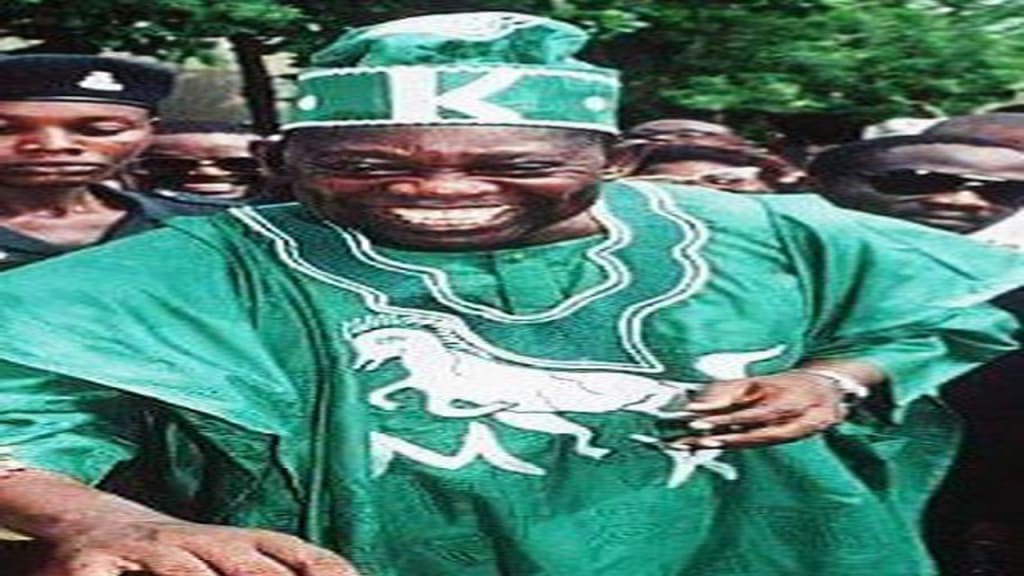JUNE 12,1993 ELECTION IN NIGERIA
the death of M.K.O Abiola

The June 12, 1993 election in Nigeria was a significant event in the country's political history. It was a presidential election held to transition Nigeria from military rule to civilian democratic governance. The election was organized to replace the military government of General Ibrahim Babangida, who had ruled Nigeria since 1985.
The two main candidates in the election were Moshood Kashimawo Olawale Abiola, representing the Social Democratic Party (SDP), and Bashir Tofa, representing the National Republican Convention (NRC). The election was widely considered free and fair, and it saw an unprecedented voter turnout, with Nigerians from various regions and ethnic backgrounds casting their votes.
M.K.O. Abiola, a prominent businessman and philanthropist, emerged as the clear winner of the election, receiving massive support across the country. His campaign promised democratic reforms, economic development, and social progress. Abiola's victory was seen as a unifying moment for Nigeria, as he garnered support from people across religious, ethnic, and regional divides.
However, to the surprise and disappointment of many Nigerians, the military government, led by General Ibrahim Babangida, annulled the election results on June 23, 1993. This decision led to widespread protests and civil unrest across the country, as Nigerians saw it as a denial of their democratic rights. M.K.O. Abiola, whose full name was Moshood Kashimawo Olawale Abiola, was a prominent Nigerian businessman, philanthropist, and politician. He was born on August 24, 1937, in Abeokuta, Nigeria, and died on July 7, 1998.
Abiola gained significant success as a businessman in Nigeria and became one of the wealthiest individuals in the country. He was the founder and chairman of the multi-billion dollar multinational conglomerate, the Abiola Group, which had interests in various sectors such as telecommunications, agriculture, and publishing.
In the political sphere, Abiola was a prominent figure during Nigeria's transition from military rule to democracy in the 1990s. In 1993, he contested the presidential elections under the platform of the Social Democratic Party (SDP) and won by a wide margin. However, the military regime at the time, led by General Ibrahim Babangida, annulled the election results and prevented Abiola from assuming office.
This led to widespread protests and a political crisis in Nigeria. Abiola was subsequently arrested and detained by the military government for declaring himself the lawful president. He remained in detention until his death in 1998, under suspicious circumstances.The June 12, 1993 election crisis in Nigeria refers to the period of political turmoil and unrest that followed the annulment of the presidential election held on that date. The crisis was a result of the decision by the military government of General Ibrahim Babangida to cancel the election results despite the overwhelming support for M.K.O. Abiola, the presumed winner.
The annulment sparked widespread outrage and protests across the country. Nigerians from all walks of life, including students, activists, civil society organizations, and pro-democracy groups, took to the streets to express their dissatisfaction with the military government's action. The protesters demanded the restoration of Abiola's mandate and the return to civilian rule.
The government responded to the protests with repression and violence. Security forces were deployed to quell the demonstrations, leading to clashes and loss of lives. Activists and political leaders advocating for the validation of the election results, including Abiola himself, were arrested and detained.
The crisis escalated further when General Babangida stepped down from power but handed over to an interim government led by Chief Ernest Shonekan. However, the interim government faced significant challenges and was unable to address the demands of the protesters. This led to further calls for a democratic transition and intensified pressure on the government to recognize the June 12 election results.
The crisis finally came to an end in 1999 when General Abdulsalami Abubakar, who had taken over as the head of state, organized a new round of elections that brought Olusegun Obasanjo to power as Nigeria's President. This marked the return of civilian rule in Nigeria after years of military dictatorship.
The June 12, 1993 election crisis remains a significant event in Nigeria's history and is often seen as a turning point in the struggle for democracy. It highlighted the deep yearning of Nigerians for transparent elections and accountable governance. The eventual transition to civilian rule in 1999 can be traced back to the lessons learned from the crisis and the demands of the people for democratic reforms.
M.K.O. Abiola is often regarded as a symbol of Nigeria's struggle for democracy and is widely recognized for his role in advocating for the restoration of civilian rule in the country. In recognition of his contributions, June 12, the day of the annulled 1993 presidential election, has been designated as Democracy Day in Nigeria. In 2018, the Nigerian government posthumously awarded Abiola the highest national honor, the Grand Commander of the Federal Republic (GCFR), and declared June 12 as a national public holiday.
The annulment of the June 12 election plunged Nigeria into a protracted political crisis, with various political and civil society groups demanding the restoration of Abiola's mandate. The crisis eventually led to the military government's ouster in 1999 and the eventual return to civilian rule.
Despite the annulment, the June 12, 1993 election remains a significant event in Nigeria's history. It is widely regarded as one of the country's most credible and peaceful elections, and it serves as a symbol of Nigeria's struggle for democracy and the yearning of its people for accountable governance.





Comments
There are no comments for this story
Be the first to respond and start the conversation.